Our Graduate Students
Our Graduate Programs are small and select. We take in eight to ten MA students per year, and about two to three new doctoral students. There are thus up to thirty current graduate students with workspace in the Department in a given year.
Students are attracted to our graduate programs by the research and teaching strength of our faculty, as well as the intimacy and collegiality of the department. They know that, at Dalhousie, they will be able to take the seminars they want, have personal, supportive relationships with their colleagues and advisors, and develop and pursue in depth their own scholarly interests.
Recent M.A. and Ph.D. students have come to us from universities across Canada, including the universities of Victoria, Toronto, Ottawa, Saskatchewan, and Manitoba as well as Queen’s, McGill, and Concordia; others have come from programs in the United States, the United Kingdom, Serbia and India.
Aisha Rahman Asha

Aisha Rahman Asha is a PhD student at English Department, Dalhousie University, Canada. She is also a faculty member at English Discipline, Khulna University, Bangladesh with a modest five-year teaching career and is currently on study leave. Her true specialty is South Asian literature but she also teaches Literary Theory, Victorian poetry, and Twentieth Century English Drama.
Alex Timmons
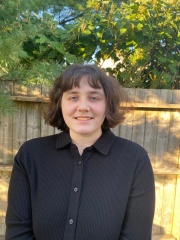
Alexandria Timmons (she/her) is a first-year MA student in the Department of English at Dalhousie University. Raised in Halifax, Nova Scotia, she developed a passion for reading, especially fantasy fiction and stories about animals, with early favorites like "Animal Farm" and "Watership Down". Her teenage years deepened her interest in classic literature, particularly the works of Shakespeare and Victorian writers.
She attended Saint Mary’s University from 2019 to 2024, initially pursuing a Business degree but eventually switching to English while earning a minor in Business. While at Saint Mary’s, Alexandria developed a keen interest in animal studies and worked at the Women’s Centre, where she organized events focused on gender-based violence and inequality. She graduated with an Honours degree in English.
Her research interests include the portrayal of nonhuman animals in literature as symbols and contrasts to human experiences, eco-fiction, the impact of technology on literature, and women’s perspectives across historical periods. For her MA thesis, she plans to explore how livestock animals are represented in English literature and their unique societal role.
In her free time, Alexandria practices creative writing in speculative fiction, researches the origins of the English language, reads books and comics, plays games, and relaxes with her two cats, Freya and Ajax.
Daryl Bruce

Daryl Bruce (he/him) is a Special Provost Alumni PhD student studying postcolonial queer literature. His work seeks to interrogate how heteronormativity has influenced queer creative output as it infringes on facets of queer life that are now, within contemporary Western culture, deemed abnormal, deviant even, and are no longer part of the “appropriate” discourse pertaining to queer experience. A graduate of Concordia University’s MA in Creative Writing, he is an Ontario Arts Council funded writer and poet with his creative work having appeared in The New Quarterly, PRISM, The Antigonish Review among others.
Ella Ratz
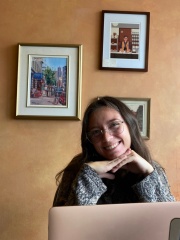
Ella Ratz (she/her) is a PhD Candidate in the field of Canadian Literature. Her SSHRC-funded dissertation project investigates the ways in which urban space is imagined within 21st-century feminist poetry in English Canada. Ella comes to Dalhousie with a BA from the University of New Brunswick and an English & Cultural Studies MA from McMaster University.
Emily Cann
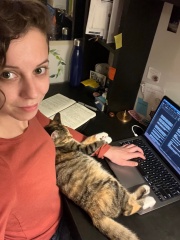
Emily (she/her) is a PhD student interested in intersections of medicine and literature. Her Killam-funded doctoral research will focus on representations of various modes of recovery in contemporary fiction and memoir. Originally from Epekwitk/PEI, Emily comes to Dal via an MFA in Creative Writing from UBC (2022), an MS in Narrative Medicine from Columbia University (2019), and an MA in English from the University of Guelph (2018). She completed her BA in English & Biology at Acadia in 2017.
Emily's poetry and fiction have appeared in various publications, including FreeFall, yolk, and carte-blanche. Her creative nonfiction was long-listed for The New Quarterly's 2023 Edna Staebler personal essay contest. She also serves as the Poetry Reviews Editor for the Artisanal Writer. Emily lives with her partner, Simon, and her cat, Chloe—both of whom try to be supportive of how much time she spends at her desk.
Gavin Foster
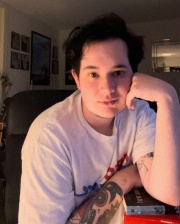
Gavin Foster (he/him) is a Killam and SSHRC funded PhD candidate studying medieval literature. His research interests include Old and Middle English translation/adaptation, Tolkien, and queer theory. His dissertation aims to trace trajectories of grief through the experiences of female characters in Old English elegiac poetry, Sir Thomas Malory’s Morte Darthur, and J.R.R. Tolkien’s The Lord of the Rings. He has presented at many conferences including the International Medieval Congress (IMC) and the International Congress on Medieval Studies (ICMS), and his research has been published in the Journal of Tolkien Research.
When not researching, he writes poetry, often focusing on intersections of personhood, place, and pop culture. He is currently working on his first manuscript, publishing bits and pieces in the meantime. You can read his poetry in Open Heart Forgery, the tide rises, and The Dalhousie Review (forthcoming).
Helen Pinsent
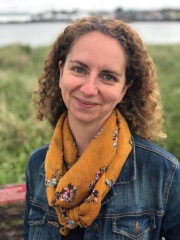
Helen Pinsent is a PhD candidate at Dalhousie, focusing on American gothic literature and popular culture with the support of a Killam Doctoral Award and a Doctoral Fellowship from the Social Sciences and Humanities Research Council of Canada. Her research interests include monster studies and mobility studies, and she is especially fascinated by the many ways the two fields overlap. She has recently presented work on Jack Kerouac, Shirley Jackson, Stephen King, and Lovecraft Country, and her dissertation is tentatively titled “Automonstrosity: Automobility and the American Dream in Post-War American Gothic.”
Isabella Lirette
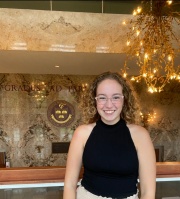
Isabella Lirette (she/her) is a joint SSHRC NSERC Indigenous funded Masters’ student studying climate fiction as well as Indigenous literature. She is interested in how fictional climate change narratives use the past, present and future as a storytelling medium. Her tentative thesis aims to examine linearity, storytelling and temporality in Michael Christies Greenwood. Isabella has a BA from Mount Allison University and a Bachelor of Education from the University of New Brunswick.
Lindsay Church
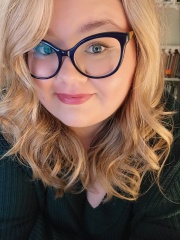
Lindsay Church (She/Her) is a SSHRC-funded, Special Provost Alumni PhD candidate studying medieval literature. Her PhD project explores the way that modern fantasy adaptations of the Arthurian mythos ‘write back’ to idea of who gets to be legendary in medieval Arthuriana (particularly Malory’s Morte Darthur). Alongside King Arthur, medieval literature more broadly, and fantasy literature, her research interests include representations of girlhood, the apocalypse, and monsters. She has presented at numerous conferences and has published in Americana (forthcoming). In her spare time, she writes fantasy fiction and bothers her cat.
Marissa Carroll

Marissa Carroll (she/her) is a PhD student interested in materiality and poetics. Her work combines book history, textual studies, and decolonial theory to map and examine literary constructions of Atlantic Canadian regional identity in twentieth-century Canadian small press poetry. She is a Nova Scotia Graduate Scholar and a Provost-Alumni Special Scholar. Marissa’s MA thesis from Dalhousie traced the circulatory poetics of The Song Fisherman’s Song Sheet, a 1920’s periodical printed in Halifax. She has a BSc in biology from the University of Ottawa and has planted trees in Nova Scotia for many summers.
Michael Cameron

Michael Cameron studies “extinction narratives” of all sorts – apocalypse and apocalyptic literature (both secular and biblical); human extinction in science fiction; nineteenth-century evolutionary theory, particularly its emphasis on species extinction and its influence on Romanticism and Victorian literature; and depictions of endangered species and species extinction in popular science. His doctoral project, tentatively titled “The Last (Hu)Man from the Age of Revolution to the End of History,” explores the figure of the “Last Man” in literature and political theory from three interpretive axes: Last Man qua “endling” or the solitary final member of the human species; Last Man qua “New Adam” or the last fertile human male charged with the procreative task of restarting the human race; and Last Man qua Nietzschean “old age of mankind” or human civilization on the decline. Cameron has been awarded two Joseph Armand Bombardier Canadian Graduate Scholarships, one Master’s and one Doctoral. His work has been published in Romanticism, and his first monograph, The Last Man and Gothic Sympathy, was published by Cambridge University Press in February 2024. "
Paige Sweeney
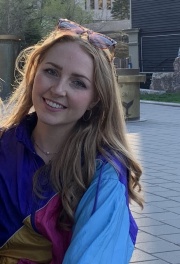
Paige Sweeney (she/her) is a first-year MA candidate. She graduated from the Honours Arts and Business Co-op program at the University of Waterloo in 2024, majoring in English Literature and Rhetoric. She also spent a semester studying Irish Literature at Trinity College Dublin.
Her undergraduate thesis examined Indigenous relationality and matriarchy in Helen Knott’s memoirs, investigating how ethical relationality is unearthed with trusting connections to one’s culture, body, and identity. Her research interests include postcolonial studies, transnational feminist literature, and displacement narratives. In her graduate studies, Paige looks forward to asking questions about the relationship between stories and power, and the way relationality plays into discourses about feminism, displacement, and decolonization.
As a co-op student, she worked in communications and proposal writing at Desire2Learn (D2L), Waterloo Region Economic Development Corporation (WREDC), and the Ontario Ministry of Finance. Paige continues to write articles for WREDC about the local tech ecosystem and the benefits of investing in Waterloo.
She is thrilled to spend the year living, reading, and writing by the ocean and she doesn't go anywhere without a library card.
Saoirse Boyle
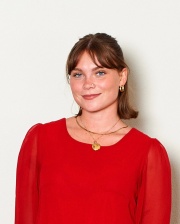
Saoirse (she/her) is an MA student in the Department of English at Dalhousie. Her research interests include feminist life writing, autotheory, and autofiction, exploring the dynamics of interpersonal relationships within the socio-economic fabric of contemporary North America.
Saoirse holds the Malcolm Ross Graduate Scholarship for her pursuit of the Creative Writing Thesis. In her creative endeavours, Saoirse writes poetry and fragmented non-fiction about the states of transition present in the interplay of the city and nature and coming-of-age. She was the managing editor of Pulse: The McGill Urban Studies Journal and has poetry published in their creative zine Prism.
Before Dalhousie, Saoirse received her BA in Cultural Studies, with a double-minor in Art History and Communications, from McGill University. She also spent a semester studying Film and Contemporary Art at the University of Melbourne.
Shannon Brown

Shannon Brown (she/they) is a Special Provost Alumni PhD student studying queer Canadian literature. Their work explores how queer Canadian subjects harness fiction as a tool to challenge national hegemonic priorities and gaze toward unusual potentialities of purpose and connection in our shared spaces. This research is especially concerned with representations of care, kinship, and queer temporalities. Shannon has published various critical works and flash fiction pieces with the UofA’s Crossings Journal, Circe Magazine, and The CrW’s Anthology, Sighting Stories. They’ve also presented work at the 2022 UofA Women’s & Gender Studies Conference. Shannon left behind Alberta’s prairies, mountains, folk music scene, and their position at a zero-waste refillery shop to live a little life out by the coast.
Shannon Payne
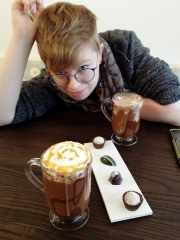
Shannon Payne is a Killam and SSHRC funded scholar. Her MA thesis focused on ecocritical readings of Guillermo del Toro films (specifically Pacific Rim, Crimson Peak, and The Shape of Water). Building on that work, her PhD dissertation, titled “It’s Not Game Over,” examines the unique capabilities of video games to respond to the climate crisis. Shannon has presented work at the IGA, and as part of the Green College Resident Members’ Series at the University of British Columbia. In addition to her academic work, Shannon has published several pieces of short fiction and she likes to unwind by running Dungeons and Dragons games for her friends.
Zoe Lambrinakos-Raymond
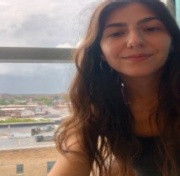
Zoe's current research interests focus on fields of literature and visual art, specifically poetry and collage in the 20th century modernist period. Her SSHRC-funded doctoral research will examine the relationship between what she posit to be modernist poet-collage artist duos who, while one is more involved in the writing of poetry and the other in the creation of collage, maintain longstanding and intimate relationships wherein the poet’s art and the collagist’s art converge, coalesce, and ultimately inform each artists’ respective practice and output, be it literary or visual. A second point of interest in her research will be individual poets well-established in poetry and poetic discourse, and who also spend a significant portion of their artistic careers practicing collage.
Zoe's research focuses primarily on artists from the transatlantic modernist period, addressing the ways in which poetry and collage engage with, borrow from, and ultimately converge with one another, despite contemporary beliefs that they belong to separate media.
Zoe received a BA with majors in Western Society & Culture and Creative Writing and an MA in Creative Writing from Concordia University. While pursuing her studies at Dalhousie University, she continued her literary and visual arts practices, focusing on experimental prose fiction, poetry, and collage.
